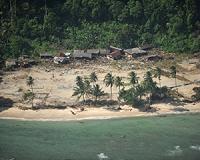| . |  |
. |
Brussels (AFP) Feb 24, 2011 Italy pleaded for EU help Thursday to face a looming Libya exodus of unparalleled proportions but looked headed to win little assistance despite warning of a potential tsunami of up to 1.5 million migrants and refugees. Scrambling for a joint response to Rome's warnings of "an exodus of biblical proportions" should Libyan leader Moamer Kadhafi fall, home affairs ministers from the 27-nation bloc went into tough talks widely diverging on what to do. "We cannot be left alone," said Italian Interior Minister Roberto Maroni as he pleaded for European Union assistance in dealing with what he termed "an invasion of one million, 1.5 million that would bring any country to its knees". "I ask Europe to settle all the necessary measures to deal with a catastrophic humanitarian crisis" looming in Libya, he said as he entered the meeting. But nations from northern and western Europe went into the talks bent on refusing fresh funds or fresh aid, said a diplomat who asked anonymity. "They're crying wolf! We're looking at a potential humanitarian crisis, not a full humanitarian crisis," the source added as ministers held tough talks over a three-hour lunch. Along with the thousands of Libyans fleeing unrest across its borders, between 750,000 and 1.5 million would-be economic migrants from Africa are estimated holed up in Libya, according to the EU's border-protection agency, Frontex. Angry Kadhafi, who last year agreed with Rome to take in boat people intercepted by the Italian navy, has warned he may open the floodgates, reneging on deals with the EU to hold back the tide of hungry Africans. "What's happening in the Mediterranean is a problem for Europe and for the world," Maroni added. "We have never seen an emergency of this scale." Italy Thursday asked its partners to pay into an emergency solidarity fund to fly to the rescue of Mediterranean nations, Cyprus, France, Greece, Italy, Malta and Spain, likely to bear the brunt of the unrest sweeping north Africa. Maroni also called for "a common asylum policy" and "for all European countries to share the burden of costs the (six) border countries will face." But there was little taste for burden-sharing as the talks began. Sweden, said Migration and Asylum Minister Tobias Billstrom, last year took in 32,000 asylum-seekers for a population of nine million without begging for help, while Italy, a nation of 53 million, screamed for aid after 5,000 Tunisians washed up on its island of Lampedusa earlier this month. If developments in Libya turn to civil war "then we'll have a huge amount of people leaving," he said. "But we're not there yet and let's hope that's not what's going to happen." Austria and Germany likewise played down Italy's problems on tiny Lampedusa, where 6,000 residents were swamped by the sudden arrival of thousands of refugees from Tunisia, following the ouster of Zine El Abidine Ben Ali. "There's no refugee influx right now. Let's not provoke one by talking about it," said German Interior Minister Thomas de Maiziere, a notion echoed by Belgium's Melchior Wathelet, saying "Let's not play at scaring ourselves." The European Commission, the EU's executive arm, last year offered Tripoli up to 50 million euros (70 million dollars) in aid to combat irregular migration but no money has been disbursed so far. However the current upheaval in Europe's southern backyard marks a new test for EU solidarity on migration flows after years of unresolved debate about how to handle the issue. Many EU states, notably Britain and the Scandinavians, refuse all burden-sharing with countries overwhelmed by migrants or asylum-seekers -- for example by examining requests by asylum-seekers in Greece to be reunited with family in Britain. Brussels wants the EU border management agency Frontex to have a budget big enough to buy boats, helicopters and planes. But EU members, notably Germany and the Nordic countries, have refused the funding. Compared to the 400,000 officers manning Europe's porous borders, Frontex can mobilise no more than 1,000 men at any one time. It has 25 helicopters, 25 fixed-wing aircraft and 100 vessels -- all on loan. Following the Lampedusa refugee crisis, which Frontex says has now eased to a trickle, a new mission titled Hermes was sent in comprising about 30 people, a plane and several ships.
Share This Article With Planet Earth
Related Links Bringing Order To A World Of Disasters A world of storm and tempest When the Earth Quakes
 Better Mapping Of Human Settlements Supports Disaster Management
Better Mapping Of Human Settlements Supports Disaster ManagementParis, France (SPX) Feb 24, 2011 When a major disaster strikes in remote parts of the world, knowing if the area is populated, and how densely, is crucial for the effective organisation of humanitarian operations. The Global Human Settlements Layer (GHSL), developed by the European Commission's Joint Research Centre (JRC), will soon provide this detailed information for the first time on a global scale. The breakthrough i ... read more |
|
| The content herein, unless otherwise known to be public domain, are Copyright 1995-2010 - SpaceDaily. AFP and UPI Wire Stories are copyright Agence France-Presse and United Press International. ESA Portal Reports are copyright European Space Agency. All NASA sourced material is public domain. Additional copyrights may apply in whole or part to other bona fide parties. Advertising does not imply endorsement,agreement or approval of any opinions, statements or information provided by SpaceDaily on any Web page published or hosted by SpaceDaily. Privacy Statement |